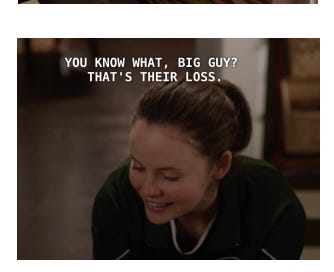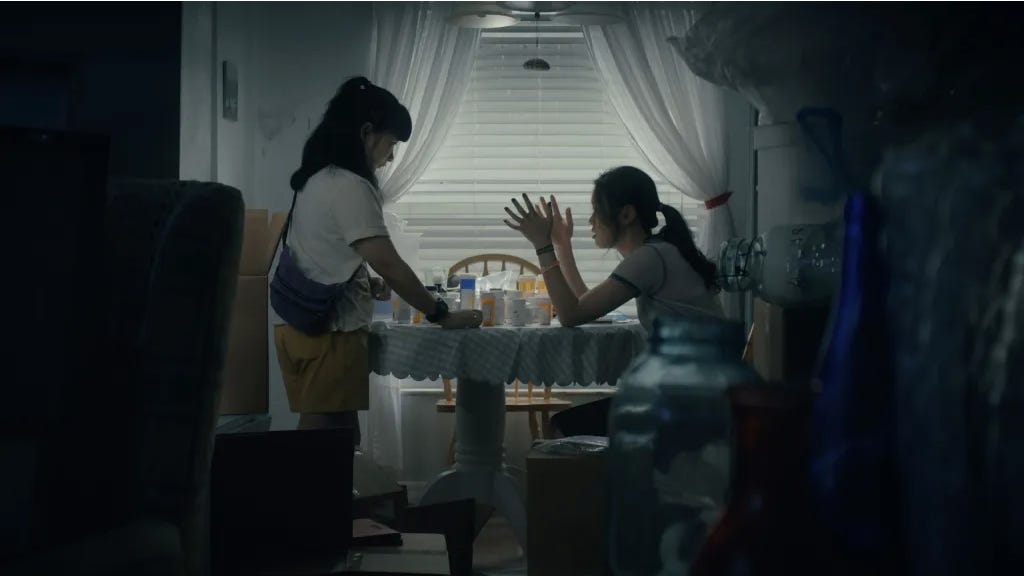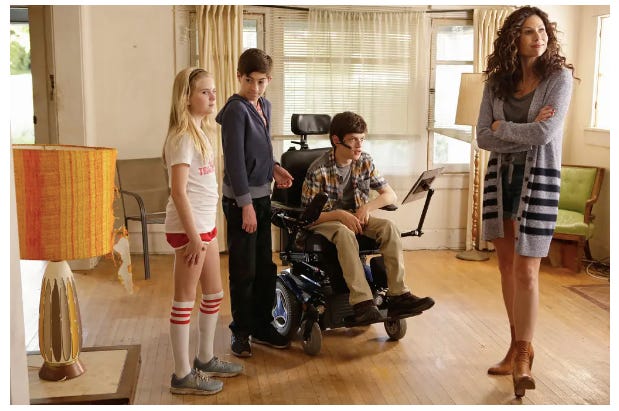On-Screen Siblings
Shows that get the special needs sibling dynamic (mostly) right, plus a book giveaway
It’s rare that television and movies touch on siblings of people with disabilities. Even more rare is when they portray the special needs sibling dynamic accurately — the love and tension, protectiveness and anger, joy and guilt, humor and heartbreak that siblings often feel.
Too often, screenwriters revert to familiar disability narratives. You know the ones: The person with a disability has to triumph over adversity, score the game-winning point, or have all their wildest dreams come true. Meanwhile, the people closest to the person with the disability benefit from the disability in some way. It somehow makes them more empathetic, better humans. At best, those stories are incomplete and invalidating. At worst, the toxic positivity is harmful to the person living with disability. I don’t think anyone wants to believe that their disability exists to inspire others or make able-bodied people kinder or more grateful.
That’s not to say there’s no place for gratitude, optimism, or lessons to be learned from hardship. But I’d much rather see characters and storylines that embrace the full spectrum of emotions and experiences. When I do see siblings portrayed honestly on screen, it resonates on a deep level.
Here are a few on-screen siblings that I admire. (Disclaimer: I’m looking at the sibling dynamic, not the overall treatment of disability, which is often flawed.)
Parenthood (Max and Haddie Braverman): For most of Haddie's childhood, her wants and needs came second to her younger brother Max, who has Asperger Syndrome. I loved Haddie’s character as well as Max, who endures setbacks, heartaches, and yes, eventually some triumphs. Their relationship is tender, endearing, and complex.
It’s also relatable that Haddie’s parents forget to go to her championship soccer game because of Max, they ask her to attend a less expensive college because of Max’s therapy expenses, and frequently put her in a caregiving role. While they sometimes allow space to express her resentment and anger alongside the deep love and gratitude she feels for her brother, it’s no surprise she focuses on academics (getting positive attention outside the family) and ends up moving across the country in season 4.
Take Me Home: In this beautiful Sundance short film, a cognitively disabled woman and her estranged sister must learn to communicate in order to move forward after their mother’s death. The film was created by a special needs sibling and stars her sister who has a developmental disability in real life. The film captures the nuances of their relationship, the complicated grief, and the fear that many people experience when they are suddenly in charge full-time of a family member who cannot live on their own.
CODA: The film CODA focuses on Ruby, a child of deaf adults, and her relationship with her parents and brother, all of whom are deaf. I appreciated that this movie had deaf actors playing all the deaf characters, something that doesn’t often happen in the film industry. Beyond that, it’s relatable to see how Ruby is both deeply inside the deaf world and outside of it, on the periphery, often taken for granted in her role as the family’s interpreter. At one point, when her parents are arguing about letting Ruby go to college, Jackie says, “She’s my baby,” and Frank replies, “She was never a baby.” Like many typical siblings, Ruby was forced to be an adult from too young an age. We watch her deal with the tension between wanting to stay and wanting to blaze her own path (something I write about in my memoir).
Speechless: A primetime show created by a sibling, Speechless centers on a boy named JJ with cerebral palsy who can’t speak and uses a wheelchair and a communication device. It’s a comedy, but it also highlights some ways JJ’s two younger siblings are often overlooked in the family. The mother is a crusader for JJ, and while advocating for him loses sight of her other kids.
Honorable mentions: I asked other siblings what shows or movies they appreciated, and the answers varied. Some loved the (book and) movie Wonder because it showed how Auggie’s sister Via’s needs were often bypassed and how protective she was of her brother. Others disliked it because the actor playing Auggie was not disabled and therefore not believable. There was a similar response to Riding the Bus With My Sister, which some found heartwarming and others cringey and saccharine. Other mentions: Atypical, A Space in Time, Five Feet Apart.
I think all would agree that we need more candid conversations (on screen and off) about disability in its broadest sense — centering not only on the person who has the disability, but also the people and systems surrounding them, capturing the full spectrum of these human experiences. Because no matter who we are and what makes us unique, when we see people like us represented in media, we feel less alone in the world.
What do you think? Any shows or movies I should add to this list?
In Other News… Want a signed copy of my book?
I’m giving away two signed copies of Forces of Nature on Storygraph. Enter for yourself or on behalf of a friend who you think would love the book. The Giveaway ends on May 18th! Enter here.
I’d love to see you in person!
May 14th: Boulder Bookstore, Boulder CO
May 20th: Eagle Eye Book Shop, Decatur GA
June 8th, 12th: My craft seminar is sold out but you can add your name to the waiting list and/or see me speak on a lunchtime business panel on June 8th (the business panel is also available via livestream)
August 27th: Changing Hands Bookstore, Phoenix AZ (Details coming soon!)
Book Clubs: I’m making plans to visit a few book clubs via Zoom this summer and fall. If you want me to be a guest at yours, reply to this email and we’ll set it up.








